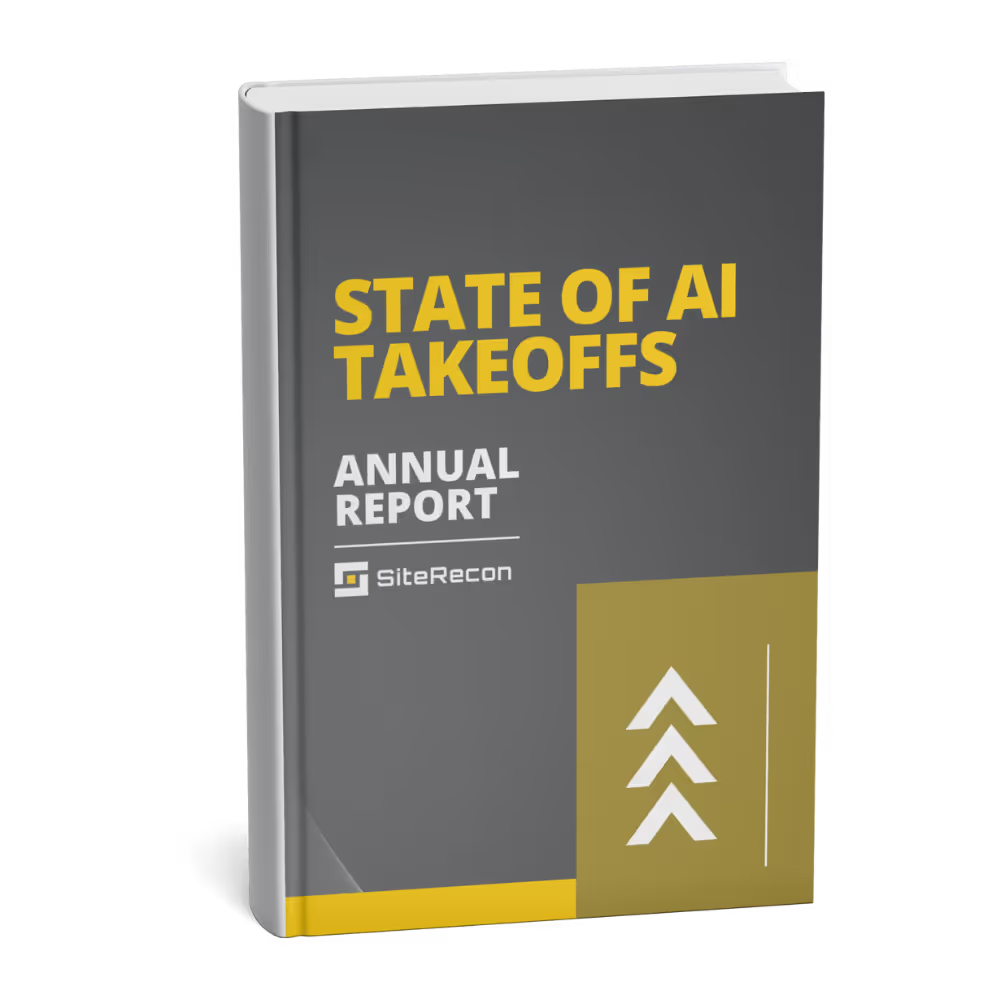Why Accurate Measurements Still Lead to Unreliable Estimates
Download the free 2025 State of AI Takeoffs Report revealing what 200+ landscape contractors discovered about the disconnect between accurate measuring and final pricing, and the estimating systems that actually work.
AI Takeoffs Solve Measuring — But That's Solves Only One Problem
In 2020, AI-powered takeoff technology promised to revolutionize landscape estimating. No more hours spent manually measuring properties. No more errors from wheel measurements or scaled drawings. Just instant, accurate property data at the click of a button. Five years later, AI takeoffs have become standard practice at successful landscape companies nationwide. SiteRecon has delivered on the promise of measurement accuracy—achieving 95-99% precision on property dimensions.

But after surveying over 200 landscape companies using AI takeoffs—including our own clients at SiteRecon—we discovered a shocking truth: accurate measurements aren't creating accurate estimates.
Despite having precise property data, 87% of landscape contractors still rely on guesstimating when converting those measurements into actual bids. The problem wasn't just the ruler—it was everything that happened after the measuring was done. Our free State of AI Takeoffs Report documents this critical industry gap and reveals what's actually working for the top-performing landscape companies in 2025. If you're using AI takeoffs but still struggling with inconsistent estimates, unpredictable margins, or estimators spending hours tweaking spreadsheets, this report explains why—and what to do about it.
What's Inside the Report
This comprehensive industry report includes research findings, real-world case studies, and actionable frameworks:
- Chapter 1: The Great AI Takeoff Disconnect
- Chapter 2: The Real Cost of the Measurement-to-Estimate Gap
- Chapter 3: The Standard AI Takeoff Workflow (And Where It Breaks)
- Chapter 4: What's Actually Working in 2025
- Chapter 5: The SiteRecon Estimator Solution
- Chapter 6: Implementation Framework
- Chapter 7: The Two Paths Forward
- Chapter 8: Research Methodology
Why This Report Matters for Your Landscape Business
Understand Why Your Estimates Are Inconsistent: Even with accurate measurements, the manual translation process introduces errors. This report explains exactly where and why accuracy gets lost.
- Validate Your Experiences: If you've wondered why AI takeoffs haven't solved your estimating problems, you're not alone—87% of contractors face the same challenge.
- Learn What Actually Works: Stop guessing about solutions. See exactly what systems top-performing landscape companies have implemented to bridge the measurement-to-estimate gap.
- Assess Your Current Process: Use the workflow breakdown to identify where approximation enters your estimating process and quantify the impact on margins.
- Build Your Implementation Roadmap: Follow the practical framework for transitioning from traditional workflows to integrated estimating systems.
- Avoid Costly Mistakes: Learn from other contractors' experiences rather than discovering these problems through lost profitability.Make Informed Technology Decisions: Understand what capabilities to look for when evaluating estimating platforms and CRM integrations.Scale with Confidence: Discover how to add estimators without losing pricing control or margin predictability.
The Hidden Costs of the Takeoff-to-Estimate Gap
Example 1: The $30K Contract That Lost $4,500
Mid-sized commercial landscape contractor wins property management contract
AI takeoff measures 120,000 sq ft turf accurately
Estimator approximates 70% to 52" mower, 30% to 21" push mower
- Actual breakdown after first month: 55% rideable, 45% push
- Labor underestimation: 18% on mowing alone
- Annual margin impact: $4,500 lost profit on $30K contract
Example 2: The Inconsistency Problem
Three estimators bid identical HOA property using same AI takeoff measurements
- Estimator A: $42,500 annual contract
- Estimator B: $38,200 annual contract
- Estimator C: $33,800 annual contract
Variance: 25% between highest and lowest
Root cause: Different approximation methods for translating generic turf measurement into specific equipment allocations
Example 3: The Scalability Wall
- Growing landscape company attempts to add junior estimators
- AI takeoffs reduce measuring time from 4 hours to 10 minutes
- But manual translation still requires 2-3 hours of tribal knowledge
- Junior estimator bids come in 20-30% below senior estimator pricing
- Company discovers they've only solved 20% of the estimating bottleneck
- Growth plans delayed until systematic estimating process is developed
FAQs
Absolutely. The research covers contractors using SiteRecon, Attentive, PropertyIntel, DeepLawn, Sitefotos, and other platforms. The takeoff-to-estimate gap exists regardless of which measuring tool you use. The report helps you understand the problem universally and evaluate solutions.
Yes, specifically for you. The report documents why even sophisticated CRM systems have no 1:1 mapping between takeoff outputs and estimating inputs. You'll learn what's missing and how to fill the gap regardless of your CRM.
The research focused on $5M-$50M companies, but the estimating challenges apply at any scale. If you're using AI takeoffs and struggling with estimate consistency, you'll find relevant insights. You may just need simpler implementation than larger organizations.
The complete report is approximately 35-40 pages. Most readers finish in 45-60 minutes. Skim Chapter 5 (solution spotlight) if you want pure research without any product information.
Yes, please do. The report is designed for team discussion. Many companies use it to create common language around estimating challenges and build consensus on solutions.
That's exactly why you should read this. The report explains why production rates matter, how to develop them, and what systems can provide industry-standard rates if you're starting from scratch.
Indirectly, yes. Better estimating systems enable faster response times, more confident pricing, and professional proposals—all factors that increase win rates. But the primary benefit is margin protection on the jobs you do win.
No. The report is written for business owners, estimating managers, and operations leaders—not IT departments. If you understand landscape estimating concepts, you'll follow everything clearly.
We invested in this research to understand our clients better and improve our product. Sharing the findings helps the entire industry understand these challenges. If some readers become SiteRecon clients, great—but the primary goal is industry education.
